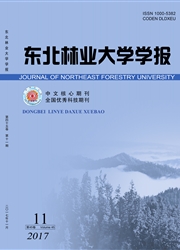

 中文摘要:
中文摘要:
通过引入马来酸酐接枝乙烯与辛烯共聚物(MA-POE)提高了木粉/聚丙烯(WF/PP)复合材料的韧性,并通过萄弹性模量分析探讨了MA-POE对WF/PP复合材料低温力学性能的影响。研究结果表明,加入MA—POE后复合皋于料冲击强度在-20℃和20℃条件下比未添加MA—POE的空白样分别提高了60%和68%;在常温下弯曲强度从41.70MPa升高到50.86MPa,提高了22%;MA.POE能够有效地降低WF/PP复合材料的弹性模量、储能模量和损耗模量,使三者都向低温偏移;采用MA—POE先与PP熔融共混后再与木粉混合的工艺可以进一步提高复合材的强度。动弹性模量分析证明添加MA—POE能够改善WF/PP复合材料的低温韧性。通过扫描电子显微镜也进一步印证了两相结合得到了改善。
 英文摘要:
英文摘要:
MA-POE was introduced to wood flour/polypropylene (WF/PP) composites to improve its toughness. Dynamic mechanical analysis was used to detect the effect of MA-POE on the properties of WF/PP composite at low temperature. Results showed that, compared with the control samples, the impact strength of WF/PP composite samples containing MA-POE increased by 60 percent and 68 percent at -20 degrees C and 20 degrees C, respectively; the flexural strength at room temperature increased by 22 percent. The properties of WR/PP composites could be further improved if MA-POE compounded with PP first and then mixed with wood flour. The elastic modulus, storage modulus and loss modulus of the WF/PP composites decreased when added MA-POE, and all of them moved to lower temperatures. The measured loss factor indicated that the toughness of WF/PP composite at low temperature was improved by the introduction of MA-POE. Scanning electron microscope (SEM) showed that the composites containing MA-POE had a better interfacial compatibility than those without MA-POE.
 同期刊论文项目
同期刊论文项目
 同项目期刊论文
同项目期刊论文
 期刊信息
期刊信息
